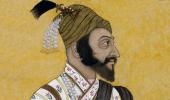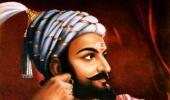'Shivaji and Sambhaji were born into the Hindu religion, and all ceremonies in their palaces were done as per Hindu customs.'
'But while governing the state, they followed the gospel of humanity.'
'They did not discriminate based on religion, caste, or colour.'
'That is the beauty of Shivaji and Sambhaji's Hindvi Swaraj.'

Author of accomplished books on Chhatrapati Shivaji, Chhatrapati Sambhaji, and the Maratha Empire, author and IAS officer Vishwas Patil tells Prasanna D Zore/Rediff.com how both Maratha kings chose their soldiers, generals, administrative and judicial staff solely based on their calibre, capabilities, trust and loyalty and that religion never played any role while appointing people to establish the dream of Hindvi Swaraj.
Your research and books highlight how many Maratha, Rajput, and Brahmin chieftains allied with Aurangzeb, Afzal Khan, and the Bijapur Sultanate against Shivaji.
How does this challenge the common perception of the Shivaji-Aurangzeb conflict as a fight between Hindu and Muslim kings?
I've noticed that many people carry books about Shivaji and Sambhaji, but nobody takes the trouble to read through the pages. Their love for Shivaji and Sambhaji is sky-high, but their reading and knowledge about these great Maratha kings is very limited. So they are not aware of the real history of Shivaji and Sambhaji.
Shivaji and Sambhaji were born into the Hindu religion, and all ceremonies in their palaces were done as per Hindu customs. But while governing the state, they followed the gospel of humanity.
They did not discriminate based on religion, caste, or colour. That is the beauty of Shivaji and Sambhaji's Hindvi Swaraj.
An important issue at that time was the slave trade, which was big in medieval India. Boys and girls were captured from various places, and this trade was mainly in the hands of Arabs who had the upper hand at sea.
Due to international relationships, Shivaji could not take major steps against this (slave trade). However, Sambhaji was the first person to ban slavery by introducing a law against it in medieval India, especially in Maharashtra and southern India.
Chhatrapati Shivaji had Muslim generals like Siddi Hilal and Daulat Khan, and his navy was led by Darya Sarang, an admiral of African origin. How do you think Shivaji's inclusive leadership contrasts with the religious polarisation we see today?
It starts from Shivaji's father, Shahaji Maharaj. When Shahaji was banished by Emperor Shah Jahan to the Adil Shahi state, he was greatly supported by a father and son duo from the Adil Shahi kingdom.
The general was Randulla Khan, a mighty general in the Bijapur court, and his son was Rustume Jamhah. They offered the fort of Bangalore to Shahaji Maharaj to stay.
In 1636, there was a great battle between Adil Shah and Kempe Gowda. This fort was won by Randulla Khan and his son, and they easily offered it to Shahaji Maharaj.
So the relations between Muslims and Hindus were very cordial in the court and family of Shivaji even as they fought for their kingdoms and territorial supremacy.
Could you give some examples of Shivaji's inclusive leadership?
In the siege of Panhala, Siddhi Wah Wah, son of Siddhi Hilal, became a martyr for Shivaji. Both Siddhi Hilal and his son offered their lives for Hindvi Swaraj.
This is one of the greatest examples of how Shivaji trusted people based on their calibre, capabilities, trust and loyalty but religion never played a role in both Shivaji's and Sambhaji's scheme of delegating important and strategically crucial responsibilities to those who they deemed capable and loyal.
In one of your tweets, you have mentioned that even Shivaji's uncle, Mambaji Bhosale, fought for Afzal Khan against him. Do you think the modern political discourse has oversimplified Shivaji's history to fit a convenient narrative?
Mambaji Bhosale was Shahaji's uncle's son -- that makes him Shivaji's cousin. He was also one of the captains of Adil Shah and he fought against Shivaji.

Do you think the modern political narrative has oversimplified Shivaji's history, valour and wisdom to fit a convenient narrative?
People are emotional or are made emotional. They are not studying in-depth (about Shivaji's life and times). That's why there is a hue and cry everywhere, nothing else. This is my perception.
Can you give an example of how Shivaji's administration was based on merit rather than religion?
One big example is that Shivaji appointed Kazi Haider, a Muslim, as the chief justice of Raigad (The capital of Chhatrapati Shivaji's kingdom after his coronation). He was a very capable jurist.
Kazi Haider was completely loyal to Shivaji and later to Sambhaji. However, in the last days of Sambhaji, he unfortunately went over to Aurangzeb. But, so long as he stayed with Shivaji, he remained loyal to the Maratha king.
Can you give examples of how Marathas, Rajputs and others fought on behalf of Aurangzeb and Afzal Khan against Shivaji in those times?
Throughout Shivaji's time, many Marathas, Rajputs, and Brahmins aligned with Aurangzeb and Afzal Khan, prioritising personal gains over loyalty to their homeland.
Raibagin Deshmukh, a warrior Brahmin chieftain from Vidarbha, was a staunch ally of Aurangzeb. She personally fought against Shivaji in multiple battles, including the 1661 battle of Umbarkhindi, where she was appointed alongside Kartalab Khan to attack Shivaji's Konkan strongholds.
In 1670, she once again took up arms against Shivaji near Dindori and Chandwad but was captured and later released by the humble, human and sagacious king that Shivaji was.
When Afzal Khan invaded Maharashtra, several Maratha chieftains fought alongside him, including Naikji Raje Pandhare, Bajaji Naik Nimbalkar, Sultanji Jagdale, Khandoji Khopde, Vithoji Haibatrao Deshmukh, Baji Ghorpade, Sardar Kharade, Kalyanji Yadav, Jhunjarrao Ghatge, Prataprao More, Jivaji Devkate, Sardar Kate, Pilaji Mohite, Shankarji Mohite, and even Shivaji's uncle, Mambaji Bhosale, who was killed at Pratapgarh.
Rajput rulers also played a major role in supporting Aurangzeb. Mirza Raja Jai Singh and Rana Jaswant Singh served the Mughal empire while at least 22 Rajput captains fought against Shivaji and Sambhaji.
These instances reveal that conflicts were driven by political and personal interests rather than religious affiliations, challenging modern narratives that frame them as purely Hindu-Muslim struggles.
If Shivaji were alive today, how do you think he would have reacted to what's happening in his name?
I can't tell you that, but he was a very generous, sagacious, farsighted and secular king, no doubt.
Your books and historical sources highlight that many Rajput chieftains fought alongside Aurangzeb against Shivaji and Sambhaji. Why do you think this aspect of history is rarely discussed in mainstream narratives?
People are not going through our history and past in depth (by using credible historical documents). Several Rajput chieftains served as Mansabdars (nobles and kings holding military and administrative ranks) in Aurangzeb's court. They were serving the Mughals to preserve their properties in Rajasthan. You can find this openly in the case of Mirza Raja Jai Singh, who had many Rajput captains in his army.
You've written extensively about Sambhaji Maharaj's struggles in your book Sambhaji and his resistance against Aurangzeb. What lessons from Sambhaji's rule should we learn today, especially in the context of religious harmony?
Sambhaji was also a benevolent king. Aurangzeb was totally cruel, but he was first a politician, then a religious fanatic.
That's why, though he killed his three brothers immediately, he didn't kill Sambhaji right away. He kept him alive for around 35 days, thinking that the Marathas would fall at his feet to save Sambhaji and offer all forts easily. He was waiting for that.
When he couldn't achieve that, he killed Sambhaji.
This shows how cunning Aurangzeb was as a ruler but also proves how formidable an opponent Sambhaji was, who like his illustrious father, never shied away from taking decisions for the well-being of the Maratha kingdom and Swaraj.
Could you tell us more about your books Shivaji Mahasamrat: The Wild Warfront and Sambhaji?
Both books are published by Westland Eka Delhi and are available on Amazon and everywhere. They are well-documented books, using credible historical resources.
I was initially interested in writing history, but I realised that if I wrote a formal historical thesis, my books would only be preserved in libraries. So to take the messages of Shivaji and Sambhaji to the common people, I accepted the form of a novel.
There has been a trend where different communities claim ownership over Shivaji's legacy. How can historians like you ensure that his true inclusive vision reaches the people?
I think we should focus on Chhatrapati Shivaji's inclusiveness, farsightedness and his basic approach towards humanity. That is important.
Could you share some striking examples of how Shivaji and Sambhaji were inclusive in giving responsibilities to people irrespective of their religion?
I've given the example of Kazi Haider. Another example is Moropant Peshwe, who was the chief secretary. In 1659, during the battle of Pratapgad against Afzal Khan, Moropant Peshwe was commanding 5,000 soldiers. Later, in the battles of Dindori and other areas in Baglan (today's Nashik-Dhule area), he fought several battles for Shivaji.
Shivaji was far discerning and looked for virtues, values and military and administrative capabilities in the people who worked with him to establish his dream of Swarajya.










